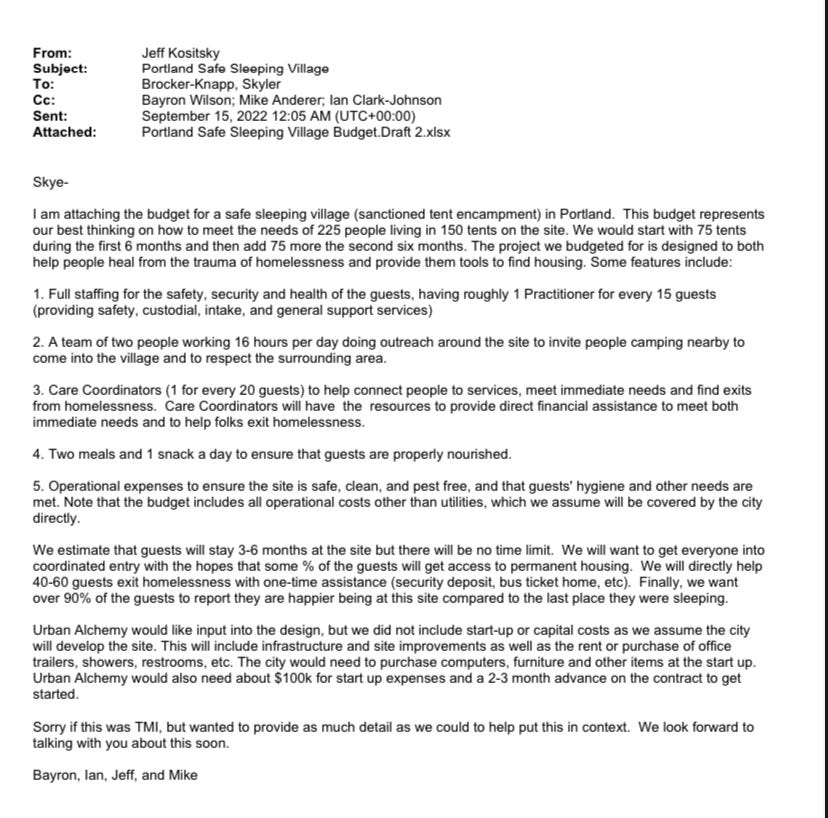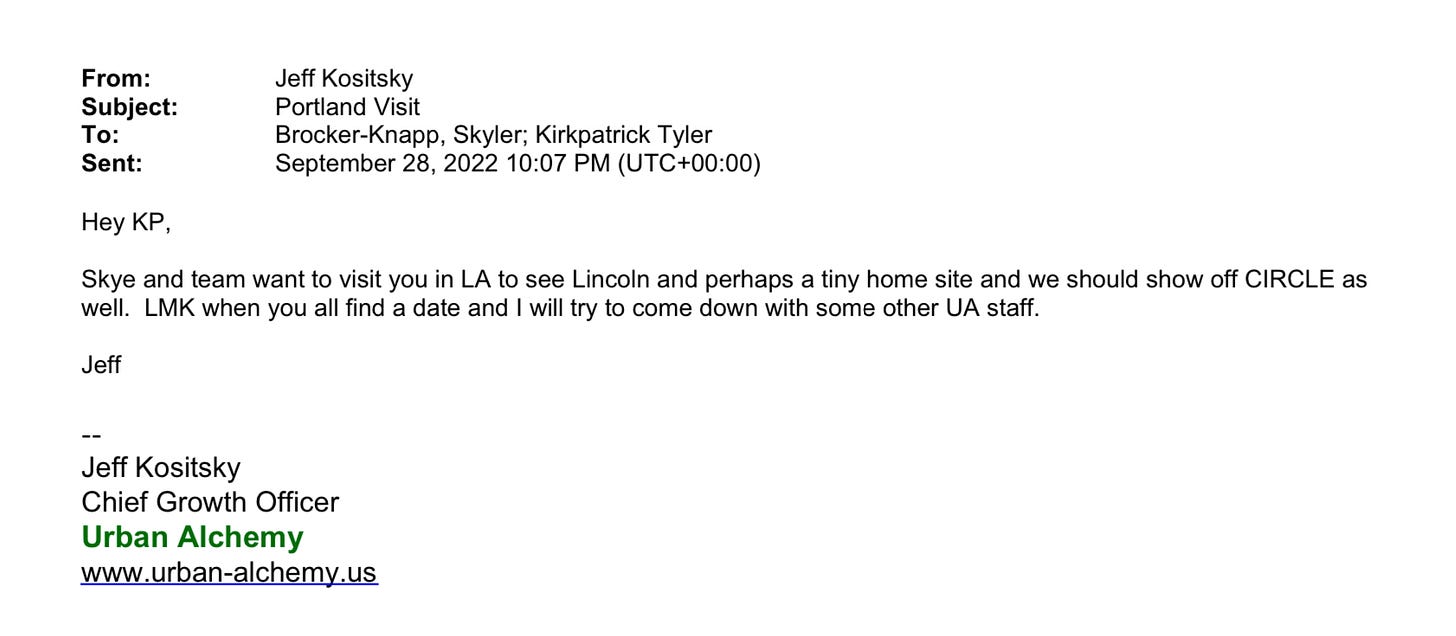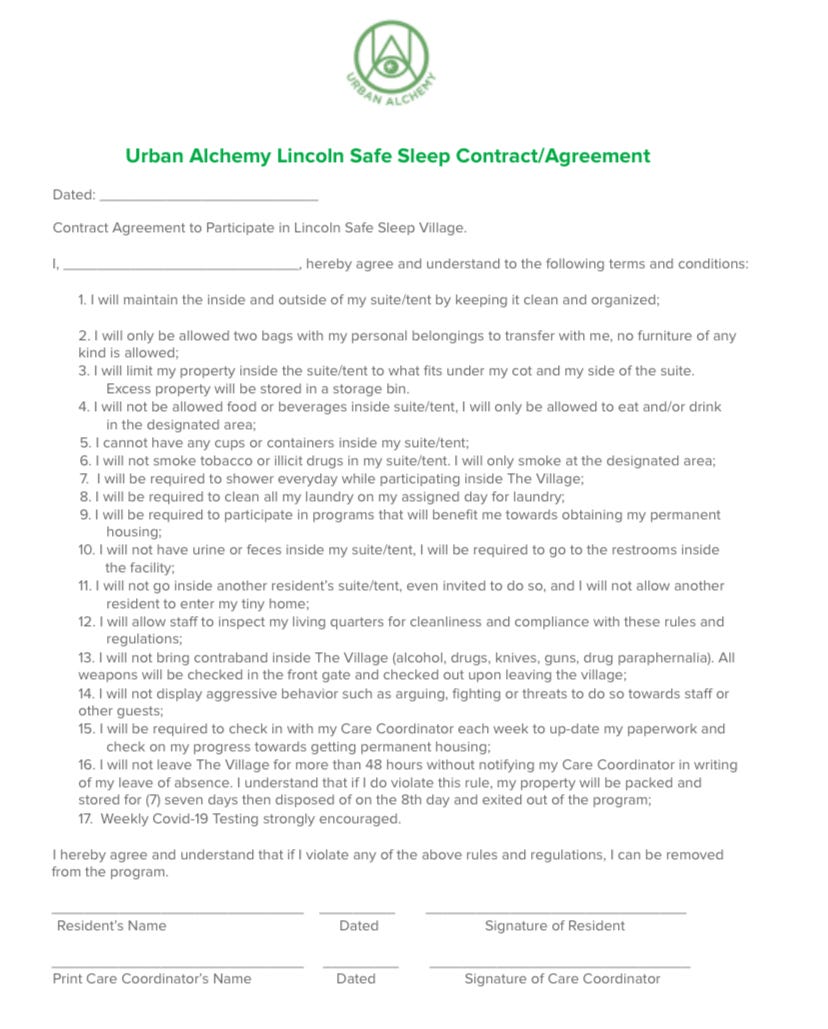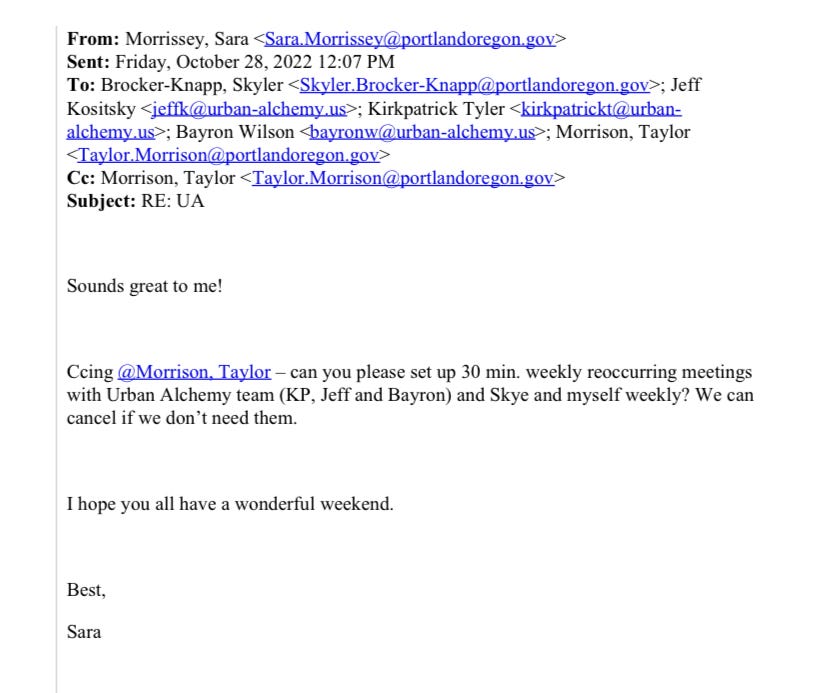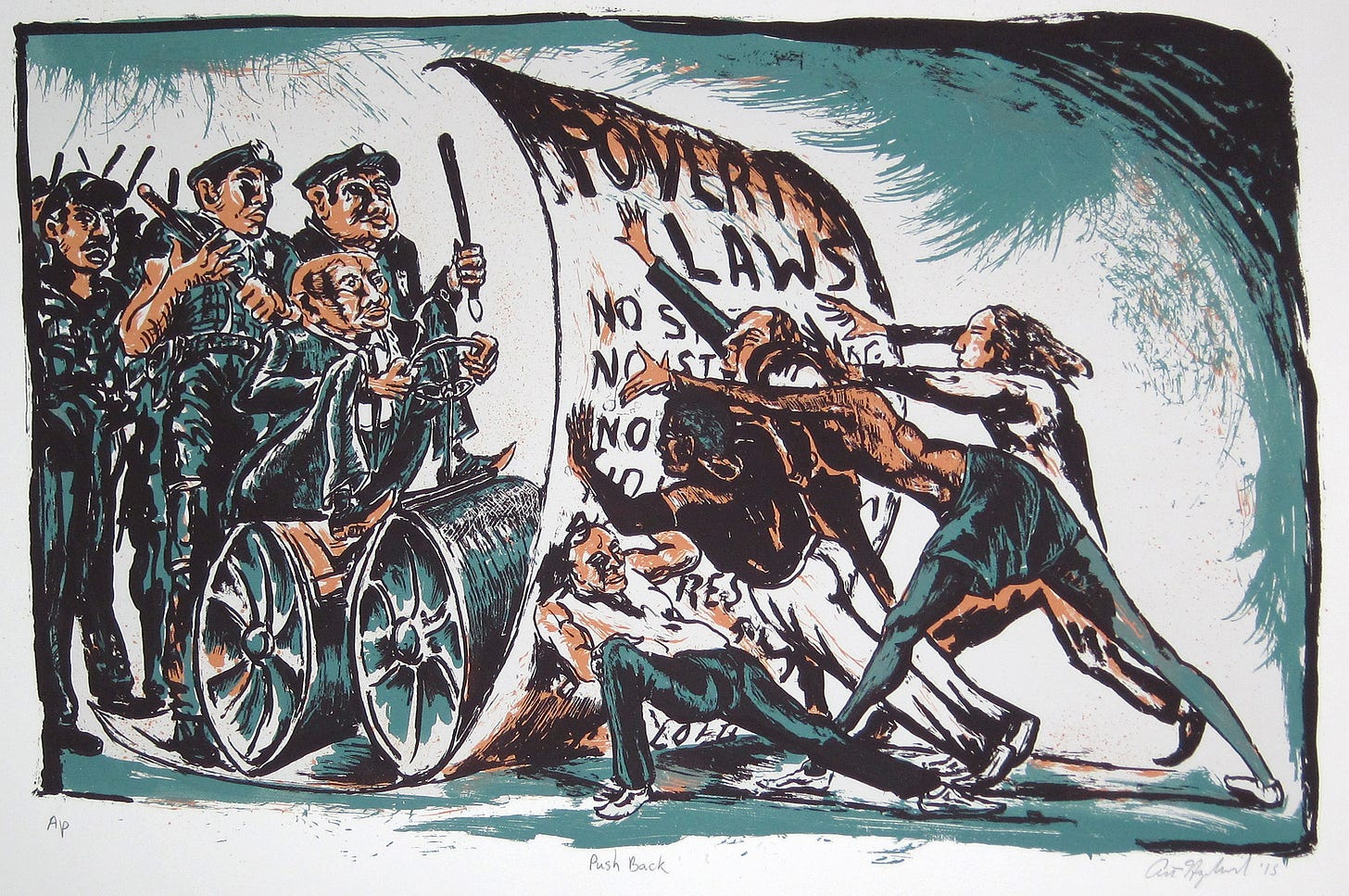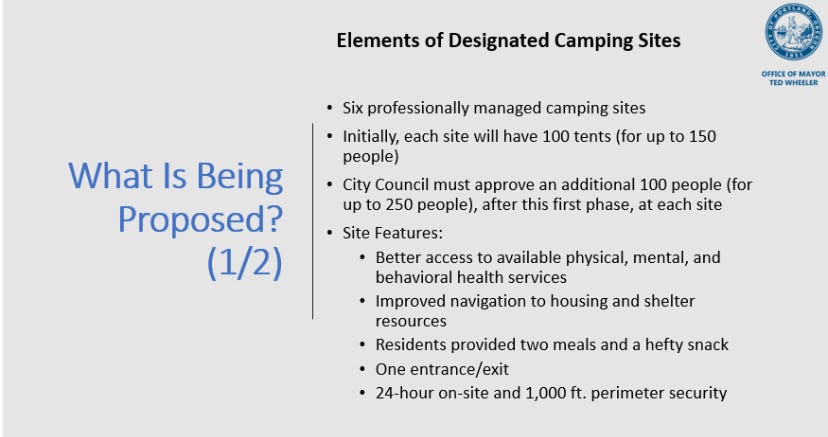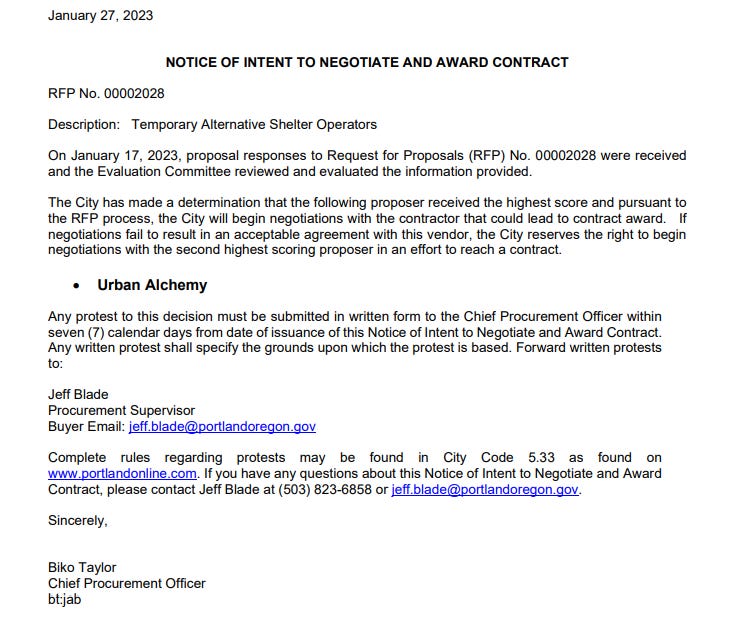Urban Alchemy’s Road to Portland is Paved with Bad Intentions
In Portland, Oregon, homeless people are being told they must go to a shelter, sanctioned encampment, or face jail.
On October 21st, 2022, Mayor Ted Wheeler and Commissioner Dan Ryan held a press conference announcing a citywide camping ban. In order to enforce this policy, the City is creating three massive sanctioned encampments of up to 250 people each.
When asked who would run the camps, Mayor Wheeler said he was speaking with Urban Alchemy, a nonprofit based in California. He announced there would be a group of City and County officials visiting Los Angeles in the following days to tour the Urban Alchemy camps.
Who is Urban Alchemy?
Urban Alchemy is on their way to becoming one of the most powerful profiteers in the homelessness industry; creating a dangerous precedent for cities in the U.S.
A nonprofit based in San Francisco, Urban Alchemy receives nearly $61 million through contracts managing shelters, sanctioned encampments, and hygiene stations.
Increasingly, and a cause for major concern, they are tasked to patrol public streets, parks, and transit stations despite not being a licensed private security company.
Urban Alchemy has come under increased scrutiny and controversy, including several lawsuits regarding civil rights and labor violations.
Shady dealings between Urban Alchemy and the City of Portland
Prior to the press conference in October, there was no indication the City of Portland was in conversation with Urban Alchemy. In fact, to our knowledge, no local service provider was contacted about the proposed policy.
Public records obtained two months later revealed emails between the Mayor’s Office and Urban Alchemy extended as far back as April 2022. Much of what was discussed in these emails became core components of the new policy, which the Mayor’s Office has dubbed ‘Temporary Alternative Shelters’.
In February, the Mayor’s Office visited San Francisco to learn more about the Healthy Streets Operation Center (HSOC), the program tasked with enforcing sweeps. According to the Mayor’s policy advisor, Skyler Brocker-Knapp, during this visit HSOC staff said Urban Alchemy was “a big key to their success”.
This piqued the interest of the Mayor’s Office and they decided to follow up. The majority of their early communications was with Jeff Kositsky, Urban Alchemy’s ‘Chief Growth Officer’. Prior to joining Urban Alchemy, Jeff Kositsky was the former head of HSOC.
Jeff Kositsky scheduled a visit to Portland in June 2022. He was joined by their CEO Lena Miller and their Chief of Government and Community Affairs, Kirkpatrick Tyler. During this visit, they visited one of Portland’s current sanctioned encampments and had a sit down meeting with the Mayor’s Office.
Urban Alchemy also requested to meet with the downtown Business Improvement District (BID).
In Portland, BIDs are called Enhanced Services Districts (ESDs). Clean & Safe is Portland’s downtown ESD, managed by Portland Business Alliance, the City’s most powerful lobbying organization. It is unclear if they met during this initial visit, however, we do know Clean & Safe eventually made a trip to Los Angeles, saying they are “optimistic about Urban Alchemy's success” in Portland.
This should come as no surprise since BIDs have a long history of advocating for and enforcing policies intended to exclude homeless people from public space. Urban Alchemy partners with and works in tandem with BIDs in San Francisco and Los Angeles.
Urban Alchemy visited Portland a second time on August 29th, 2022. This time they sent Bayron Wilson and Ian Clark Johnson. During this visit Urban Alchemy met with the Mayor’s Office at City Hall. The meeting was followed by a tour of one of Portland’s sanctioned encampments. They were joined by Nate Takara, Incident Commander for the Street Services Coordination Center, and Mike Myers, Portland’s Community Safety Transition Director.
After their visits to Portland, Urban Alchemy refined the details of their proposed contract and emailed a new draft to the mayor’s office on September 15, 2022.
In the new, detailed proposal, the camps would consist of 225 people living in 150 tents. They would start with 75 for the first six months and then add an additional 75 in the following six months. Urban Alchemy would have 1 ‘practitioner’ per 15 residents. Two people doing outreach to ‘invite people camping nearby’ into the sanctioned encampment. Care coordinators would be assigned to each person in the encampment and two meals and one snack would be provided daily. Startup costs were estimated to be $100,000.
After the Mayor’s Office received this proposal they suggested visiting Los Angeles to tour the Lincoln sanctioned encampment. Jeff Kositsky also recommended they visit with CIRCLE, LA’s version of Portland Street Response, which is overseen by Urban Alchemy.
Urban Alchemy also shared the Lincoln sanctioned encampment resident agreement, which included strict and invasive rules for those staying in the encampment. Some rules included disallowing residents from leaving the encampment for more than 48 hours, no food or drink inside tents, restrictions on how many belongings people can have in their tents, and regular inspections of their tents by Urban Alchemy staff.
The Mayor’s Office visit to Los Angeles happened on October 24, 2022, only a few days after Ted Wheeler’s press conference announcing the citywide ban on camping and forthcoming sanctioned encampments. After the visit, Sam Adams, former mayor and mayoral staffer, told media Urban Alchemy was a ‘strong contender’ to run the encampments.
Following the visit to Los Angeles, Urban Alchemy and the Mayor’s Office agreed to weekly meetings to further discuss the details of a potential contract.
City Council paves the road for Urban Alchemy
By the time of the announcement, it was practically a done deal; however, City Council still had to pass legislation allowing for the creation of the new camps. City Council did this in the form of five ordinances.
The first ordinance established ‘key actions to increase affordable housing construction’, a lackluster proposal directing council to identify potential sites for affordable housing construction. Commissioner Jo Ann Hardesty attempted to give this ordinance more teeth, introducing an amendment to explore the use of eminent domain to create housing. The amendment was unanimously voted down by the rest of council.
The second ordinance established a partnership with Worksystems Inc to increase ‘non-standard work’ opportunities.
The third ordinance is what actually established creation of the new sanctioned encampments.
The fourth ordinance was a vague proclamation regarding ‘City Budget Priorities’. This basically stated the City would prioritize City Budget funds towards the new encampments, as well as focusing their advocacy towards the County, Metro, State, and Federal government to help fund the encampments. The City did not have any funding secured at this point.
The fifth and final ordinance established the creation of a diversion program specifically for homeless people. However, this ordinance would require a partnership with the Multnomah County District Attorney’s Office who did not confirm they would support this project.
Over 200 people signed up to testify. Suspiciously, despite the overall majority of people testifying in opposition to the new policy, the first hour was almost entirely filled with people testifying in support. This included 16 people who randomly appeared on the testimony sheet near the beginning, despite many of them not signing up to testify prior to the meeting.
Public records later revealed Dan Ryan personally requested these testifiers be moved up on the roster. The prioritized testifiers included Andrew Hoan, CEO of Portland Business Alliance, as well as a cadre of business and real estate lobbyists.

After nearly six hours of testimony, City Council had a week to deliberate before the final vote on November 3rd, 2022.
Given the lack of engagement with homeless people, a town hall was organized by Street Roots which was attended by Ted Wheeler and Dan Ryan. The listening session was an opportunity for homeless people to share their concerns. Overwhelmingly, those who participated in the town hall were opposed to the mass camps and emphasized the importance of street outreach. Despite all of the impassioned testimony, it did little to change the minds of City Council.
After all was said and done, City Council approved the new policy. The only commissioner who voted in opposition to the coercive sanctioned encampments policy was Jo Ann Hardesty.
The passage of the new sanctioned encampments policy was quickly followed by the Fall Budget Monitoring Process (BMP), allowing City Council to almost immediately secure funding for the new sanctioned encampments.
During the Fall BMP, Mayor Wheeler proposed an allocation of $27 million towards the new sanctioned encampments policy, with $12 million allocated towards contracting with a service provider to run the camps. They also allocated $500,000 towards private security contracts. The rest of the $27 million proposal included allocations towards the construction of the encampments, funding for the Homelessness and Urban Camping Impact Reduction Team (the City program in charge of sweeps), among other things.
City Council ultimately approved Mayor Wheeler’s $27 million budget proposal with Jo Ann Hardesty, once again, being the lone vote in opposition.
The ‘competitive’ bidding process
With legislation in place and funding secured to move forward, the City wasted no time marching forward with a competitive bidding process.
A Request for Proposals (RFP) opened on January 17th, 2023. Only two organizations submitted bids, Urban Alchemy and a group from Vancouver, Washington called Simply Human Project. No local organizations submitted a bid for the contract.
Despite repeated claims by the Mayor’s Office saying Urban Alchemy was just one organization they were looking to potentially contract with, emails suggested otherwise. This included emails from Skyler Brocker-Knapp saying “we are so excited to bring them to Portland” and Jeff Kositsky saying “it’s very exciting things are moving forward”. Both of these emails were sent well before the City of Portland had put out an RFP.
Further, much of the details of the proposed encampments as presented by the Mayor’s Office appeared eerily similar to details included in early proposals Urban Alchemy shared via email. This included the 15:1 staffing ratio, the two meals and one snack, and the desire to have a service provider who also operates as a workforce development program (one of Urban Alchemy’s key modus operandi).
Although Urban Alchemy did participate in a competitive bidding process, versus receiving a no-bid contract much like the majority of their contracts in San Francisco, the RFP was very obviously designed with Urban Alchemy in mind; paving the way for their inevitable awarding of the contract by the City of Portland.
The RFP process was quick and Urban Alchemy received a notice of intent to award from the City of Portland on January 27th, 2023.
In the bid submitted by Urban Alchemy they proposed a budget of $5.1 million annually for one tent site with 150 people. Their cost breakdown estimated the encampments would cost $94 per person per night or nearly $34,000 per person per year. This is in addition to roughly $400,000 in one-time start-up fees.
According to the Mayor’s Office, because Urban Alchemy was awarded this contract for the first mass sanctioned encampment they can be awarded future contracts without an RFP. Should Urban Alchemy run all six of the proposed mass encampments, annual operating costs would come out to be $30 million.
To reiterate, Urban Alchemy’s proposal is for a tent site of 150 people; however, the City is proposing mass camps of up to 250 people. Should Urban Alchemy expand capacity at their tent sites the budget could go above and beyond what is currently being proposed.
Both the proposals submitted by Urban Alchemy and Simply Human are below:
First site identified
Before Urban Alchemy could set up shop in Portland, the City had to find a spot for the first mass encampment. The City succeeded in securing a location, officially announcing the site during a press conference on March 9, 2023.
Although the City ultimately closed in on a deal for the site located in the Central Eastside, the Mayor’s Office encountered a few obstacles attempting to negotiate leases for the mass encampments elsewhere, with one property owner pulling out of negotiations unless the City of Portland capped the encampment to 40 people.
After the announcement of the first site, the Brooklyn Neighborhood Association co-hosted a listening session with the Mayor’s Office and Urban Alchemy. Many neighbors expressed concern regarding the lack of outreach from the City before the announcement.
Support has been expressed by the Central Eastside Industrial Council, who manages the Central Eastside Together Enhanced Services District. The Mayor’s Office has repeatedly said partnerships with the ESDs will be integral to the mass encampments, including the potential of having ESDs oversee private security contracts surrounding the encampments.
What’s next?
This Wednesday, April 19th, City Council will officially vote to approve a price agreement with Urban Alchemy for up to $50 million over the course of five years.
This vote does not guarantee Urban Alchemy will be paid $50 million, but rather, authorizes the City to make as many payments as they want to Urban Alchemy over the next five years as long as it doesn’t exceed $50 million. Should the City of Portland decide to pay Urban Alchemy more than $50 million within the next five years, another vote would have to happen through City Council.
Update: City Council unanimously voted in favor of the $50 million price agreement, despite almost all testimony being in opposition.
This ordinance directs all payments for this price agreement to come out of the Office of Management and Finance’s (OMF) operating budget. Currently, due to allocations made during the Fall BMP, OMF only has $12 million in one-time funds that can be used to pay Urban Alchemy. Ongoing, annual funds have not yet been allocated in OMF’s budget.
The City of Portland is currently undergoing the budget process for Fiscal Year 2023-24. OMF’s requested budget does not specify ongoing funds regarding the operating costs for the mass encampments. It is likely the Mayor’s proposed budget, which will be published in early May, will include budget allocations for the contract (and potential future contracts) with Urban Alchemy.
Beyond the City’s ongoing contract negotiations, Multnomah County has also recently expressed interest in contracting with Urban Alchemy for patrols around the downtown Behavioral Health Resource Center.
Although details are scarce, this potential contract seems to mirror the ambassador program in San Francisco, where Urban Alchemy’s ‘practitioners’ are tasked with patrolling public sidewalks in the Tenderloin and Mid-Market neighborhoods.
This program has come under increased scrutiny because the ambassador program operates like private security, despite Urban Alchemy not being a licensed private security company; thus allowing them to skirt all accountability and oversight associated with licensure.
Urban Alchemy’s expansion in Portland is happening fast, much like what happened in California. There’s plenty of lessons to be learned. The next few months will require watchful eyes on City Council to prevent Urban Alchemy from taking over this city block by block.










